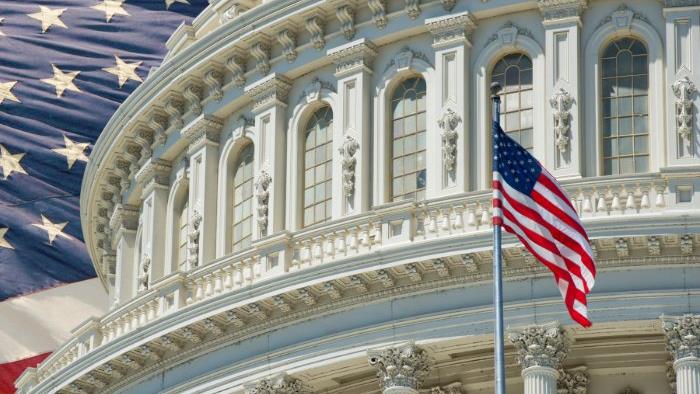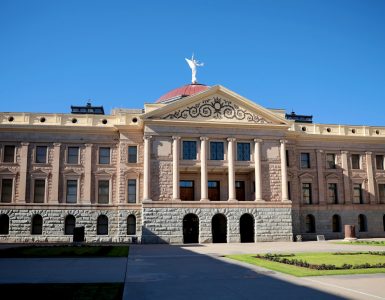Latest news from Washington, D.C. produced by Total Spectrum/SGA exclusively for members of the Arizona Chamber of Commerce & Industry
More Info: Michael DiMaria | Partner and Vice President of Business Development | 602-717-3891 | [email protected]

Thanks for your interest in Washington, D.C., and thanks for reading This Week in Washington.
The lead story this week was the passing of the omnibus appropriations bill, first in the House of Representatives on Wednesday and then in the Senate yesterday. There were a series of twists and turns, especially in the House. Steve Ruhlen, my colleague who has spent years working and understanding the appropriations process, summarizes it all in his update article.
Heard on the Hill covers Washington’s reaction to the Russian invasion of Ukraine, a possible new legislative agenda for Senate Democrats, final passage of postal reform in the Senate, and a few parting words about the end of the worst part of COVID.
Congressman Erik Paulsen served on the House Ways and Means Committee and as Chairman of the Joint Economic Committee. He is concerned about the impact of our ever-growing national debt on each of us, and I think you will be concerned too when you read his article.
Ramona Lessen monitored two hearings for This Week. The first is timely, given this weekend’s shift to Daylight Savings Time. You can see her coverage of a hearing before the House Energy and Commerce Subcommittee on Consumer Protection and Commerce entitled, “Changing Times: Revisiting Spring Forward and Fall Back.” The second hearing was before the Senate Banking, Housing, and Urban Affairs Committee on examining mandatory arbitration in financial services products.
We’ll be back in two weeks for the next issue of This Week. Stay well.

Total Spectrum Managing Director
Heard on the Hill
By Steve Gordon, Total Spectrum Managing Partner
“History doesn’t repeat itself, but it often rhymes.” ~Mark Twain
George W. Bush ran for President in 2000 as a compassionate conservative, and he began his administration in 2001 determined to fulfill that vision. Then 9-11 permanently changed his presidency.
Joe Biden represented Delaware – a very pro-business state – in the U.S. Senate and was viewed as a moderate. Candidate Joe Biden was considered an electable compromise in the 2020 Democratic primaries and the person who could bring progressives, moderates, and independents together. But President Joe Biden created a domestic legislative agenda last year that was attuned primarily to the goals of progressives.
Russia’s invasion of Ukraine has changed President Biden’s presidency too – and perhaps permanently. Both George W. Bush and Joe Biden unexpectedly became war-time presidents.
President Biden seems to have – at least for now – bipartisan support in Congress for his response to the Russian invasion. His approach to both our allies and Putin’s savage attack has united NATO nations like never before.
President Biden announced Tuesday that he had signed an executive order that banned the import of Russian oil, liquified natural gas, and coal. Senate Minority Leader Mitch McConnell announced Tuesday that there would be around $14 billion for Ukraine in the appropriations bill currently working its way through Congress. (The final number is $13.6 billion).
The Russian invasion is over two weeks old, and the messaging from the President and his administration is that the war will not be over any time soon. Russia has a significant size of force advantage, but their logistics and morale of their troops are poor. Ukraine has home field advantage, and the courage and morale of Ukrainians is off the charts. This is not the easy win Putin thought he would have, but he feels he can’t afford to lose the war. The administration expects Putin to double down with unimaginable brutality and bluster over the next few weeks.
The view of our defense experts is that Russia may be able to take control of key cities. But they also expect that the leadership of Ukraine’s government, the courageous response of their citizens, and the generous support of democracies throughout the world will make it difficult for Russia to occupy the country.
Polls released this week show that Americans are responding to the President’s handling of this crisis, and that his popularity has bounced up a few points. But the administration clearly understands that Americans will be impacted by the war, and that pain is starting at the gas pump. Gas prices on average have gone up about 70 cents per gallon in the past few weeks and will undoubtedly continue to rise. The President is blaming the price spike on “Putin’s War” as a way of shielding resentment from voters this November.
Senate Democrats talk about changing their agenda.
The Senate Majority is clearly in play this year and Build Back Better, the President’s signature legislative proposal, is going nowhere. That’s primarily because Senators Joe Manchin (D-WV) and Kyrsten Sinema (D-AZ) oppose the bill as currently written and won’t vote to change the Senate’s filibuster rule.
Democratic Senators who are up for reelection this year are talking about gutting the present Build Back Better proposal, suggesting it be repackaged as a cost-cutting bill that will help Americans deal with rising inflation starting with a plan to lower prescription drugs. Meanwhile, Senator Manchin has his own plan designed to reduce the deficit, lower prescription drugs, combat climate change, and reform the tax code. Democrats want to see if they can work with Senator Manchin to repackage and repurpose Build Back Better.
Democrats could pass a new Build Back Better plan using the budget reconciliation process, but that would require that all 50 Democrats stick together, and it is hard to imagine progressive Democrats jumping on that bandwagon.
Put a stamp on it – it’s done.
The Senate passed this week the long overdue postal reform bill which had previously passed the House of Representatives. The $107 billion bill had wide bipartisan support and passed the Senate 79 to 19. It now goes to the President for signing.
The bill removes financial liabilities and payments that have put great financial burdens on the USPS. It also mandates timely delivery requirements, encourages the purchase of new mail handling equipment, and encourages the push into package handling.
The worst of COVID is FINALLY behind us – at least for now.
Hawaii will lift its mask mandate at the end of March, becoming the last state to drop their indoor mask mandate. Twenty-six months ago – on January 20, 2020 – the Centers for Disease Control and Prevention announced the first U.S. laboratory-confirmed case of COVID-19 in the U.S. COVID has impacted almost all of us in some way and it has taken the lives of 964,847 Americans as of March 8, 2022.
Appropriations Update
By Steve Ruhlen, Total Spectrum Partner
Once again, Congress punted on its annual duty to produce the twelve appropriations bills that fund the U.S. Government. And, as usual, after marathon negotiating sessions pushed by a looming government shutdown and the urgency of the Ukraine war, they wrapped these dozen bills along with other bipartisan supported measures into a $1.5 trillion omnibus funding bill. The government has been operating under a continuing resolution (CR) – legislation that buys time by keeping the government running at the prior fiscal year’s levels – since last October. The current CR expires tonight (March 11) at midnight.
Last night, the Senate passed the omnibus 68-31. The House had approved the funding bill late Wednesday night.
The omnibus increases defense spending by 5.6% to $782 billion and domestic or social spending by 6.7% to $730 billion. The defense number is over $40 billion more than congressional leaders and the administration had agreed to late last year and is a victory for congressional Republicans who railed against President Biden’s initial proposals to slash defense to $715 billion.
Because of the slim five vote majority Democrats hold in the House, passing the omni was a tightrope walk between the left and right. Republicans opposed the domestic spending increases in the bill, while many Democrats opposed the increase in defense spending. To appease both groups – and most importantly, assure passage of the bill – Democratic leadership set up separate votes on the defense and domestic spending portions of the omnibus, allowing dissenters to register their votes while still ensuring passage of each element. Both parts were then combined into a final bill and sent to the Senate.
The deal includes a bipartisan provision providing an additional $13.6 billion for humanitarian, economic, and military aid to Ukraine and NATO countries such as Poland who are assisting Ukraine. The Biden administration had requested $10 billion.
The House had been preparing to pass a separate set of sanctions against Russia that included a ban on imports of Russian oil and the raising of tariffs of products from Russia. However, the tariff provision has been dropped per an administration request that the U.S. first discuss the measure with our allies. The oil ban is essentially moot, as President Biden announced the ban earlier in the week – to the consternation of some congressional Democrats that he had pre-empted their legislation – and it is not likely that the Senate will vote on the measure. Nonetheless, on Wednesday the House overwhelmingly passed the oil ban.
The omnibus bill was to include $15.6 billion for domestic and international efforts to address COVID. True to Senate Minority Whip John Thune’s prediction in a recent Spotlight interview, Republican and Democratic negotiators agreed to pay for it using funds that had been assigned but not yet transferred to many states. Members from the affected states protested the provision and put in doubt House passage of the omnibus. Speaker Pelosi pulled the provision from the bill and the COVID funding will proceed as separate legislation. The House will vote on the COVID funding next week, though it faces an uncertain future in the evenly-divided Senate.
The COVID funding represents a dramatic reduction of the Administration’s initial request of $35 billion and is regarded as another victory for Republicans. House and Senate Republicans opposed spending additional money on pandemic relief, questioning the need and demanding an accounting of previously appropriated COVID funds.
Not appearing in the omnibus are dollars to replenish the Restaurant Revitalization Fund. Many restaurants qualified for the grants last year but did not receive any funds before the available pot of dollars ran dry. Also absent from the legislation are extensions for popular tax breaks, such as the full expensing of research and development costs and the COVID-era employee retention tax credit for small business.
Why the National Debt Impacts Each of Us
By Congressman Erik Paulsen, Total Spectrum Strategic Consultant
America’s debt recently surpassed $30 trillion, which compares to just under $12 trillion a decade ago. The federal government is currently spending $1 billion a day on interest payments alone. Over the next ten years, interest on the debt at current rates will total $5.4 trillion. But interest rates are going to rise to confront inflation, so the federal government will soon be making even larger interest payments on our debt.
Most Americans agree that Congress should control or even start to pay down the national debt, but that agreement stops when Americans are asked what programs warrant support and what programs should be cut. Many Americans support increased spending on domestic programs. Many Americans understand that the nation must have a strong defense, particularly with rising threats from Russia and China. Also, many Americans support increased spending on defense, but only if it doesn’t dilute the available funds for domestic programs.
In 2019, major entitlement programs—Social Security, Medicare, Medicaid, Obamacare, and other health care programs—consumed 51 percent of all federal spending, larger than the portion of spending for all other national priorities (such as national defense) combined. Add the cost of interest on the debt to the cost of entitlement programs and the problem becomes crystal clear.
We have been putting the cost of many programs on the national credit card, and it hasn’t been as noticeable in times of low interest rates. But now inflation is at a 40-year high and interest rates are going up. Many in Congress are proposing more government spending, as well as tax increases, which would drive inflation even further.
Here’s an example of how the costs of the rising debt will ultimately come out of your pocket – and mine.
Mr. and Mrs. Brown earn very good salaries and have a combined annual adjusted gross income of $400,000. They have two children near college age. They work hard to balance the family budget, and keep an eye on mortgage payments, groceries, gasoline, healthcare, utilities, automobile loans, and credit cards.
While the Browns were focusing on their own expenses this past year and a half, Congress passed six major spending bills that provided relief to Americans from the pandemic. As a result, the annual budget deficit of the United States will be over $1 trillion for the foreseeable future. Even though the Browns have worked hard to balance their own family budget, the federal government now has to deal with the effects of the COVID epidemic. But more borrowing and higher government spending is not sustainable.
The Browns currently pay around $110,000 in federal taxes on their adjusted gross income of $400,000. The Biden Administration and Congress are proposing tax increases, and the Browns could expect their taxes to increase by at least $25,000 if those changes become law.
These higher taxes would be used to fund additional government spending, not pay down our existing national debt. Does this sound fiscally responsible?
A higher national debt will eventually result in the reluctance of investors and foreign governments to purchase our Treasury bonds, thereby forcing interest rates to rise. The result will be that the Browns will have to pay more for their mortgage, auto loans, credit cards, and any other lending products they may have.
Some economists would propose that the federal government allow the value of the dollar to plummet so it can repay our debt with cheaper dollars. The Browns would surely have to contend with even higher inflation rates if our policy makers decided to go down that rabbit hole.
Inflation is here. Interest rate increases are coming. How we deal with our national debt will soon impact each of us in ever more significant ways.
Reducing the national debt – and its impact on each of us – will require American voters to demand action. Hopefully, Americans will demand action when they feel the impact that the national debt has on their personal finances.
Hearing Report
By Ramona Lessen, Executive Director, Total Spectrum
House Energy and Commerce Subcommittee on Consumer Protection and Commerce hearing on “CHANGING TIMES: REVISITING SPRING FORWARD, FALL BACK”
Wednesday, March 9, 2022 – 9:30am
To view a livestream of the hearing please click here.
Representative Frank Pallone (D-6th-NJ), Committee Chairman
Representative Jan Schakowsky (D-9th-IL), Subcommittee Chairperson
Representative Gus Bilirakis (R-12th-FL), Ranking Member
Witnesses:
Steve Calandrillo
Jeffrey and Susan Brotman Professor of Law
University of Washington School of Law
Beth Malow, M.D.
Professor of Neurology and Pediatrics, Director, Vanderbilt Sleep Division
Vanderbilt University Medical Center
Lyle Beckwith
Sr. Vice President, Government Relations
National Association of Convenience Stores
Senate Banking, Housing and Urban Affairs Committee hearing on Examining Mandatory Arbitration in Financial Service Products
Tuesday, March 8, 2022; 10:00 a.m.
To view a livestream of the hearing please click here.
Senator Sherrod Brown (D-OH), Chairman
Senator Patrick J. Toomey (R-PA), Ranking Member
Witnesses:
Mr. Paul Bland
Executive Director
Public Justice
Mr. Remington A. Gregg
Counsel For Civil Justice and Consumer Rights
Public Citizen
Professor Todd J. Zywicki
George Mason University Foundation Professor of Law
George Mason University Antonin Scalia School of Law
Mr. Steven Lehotsky
Lehotsky Keller LLP
On Behalf of the U.S. Chamber of Commerce
Professor Myriam Gilles
Paul R. Verkuil Research Chair and Professor of Law
Congressional Calendar
Monday, March 7
- 6:15 p.m. Senate Foreign Relations Committee Closed/TS/SCI Briefing: Update on the Russian Invasion of Ukraine.
Tuesday, March 8
- 9:00 a.m. House Foreign Affairs Subcommittee on Europe, Energy, the Environment and Cyber briefing – Celebrating International Women’s Day: Updates from the Women-Led Democratic Movement in Belarus.
- 9:30 a.m. Senate Armed Services Committee hearing on reviewing testimony from the U.S. Strategic Command and Space Command for the fiscal 2023 defense authorization request.
- 10 a.m. Senate Energy and Natural Resources Committee business meetingto consider five energy and science nominations.
- 10 a.m. House Agriculture Farm Commodities Subcommittee virtual hearingon rural development and the farm bill.
- 10 a.m. House Financial Services Committee hybrid hearing on the key causes of inflation. 2128 Rayburn.
- 10 a.m. House Judiciary Crime and Terrorism Subcommittee virtual hearingon public safety in the Covid-19 era.
- 10 a.m. House Natural Resources Committee virtual hearing on examining the development of tribal co-management.
- 10 a.m. House Science Committee virtual hearing on climate adaptation and resilience.
- 10 a.m. House Small Business Committee hearing on the Small Business Innovation Research and Small Business Technology Transfer programs.
- 10 a.m. House Transportation Railroads and Pipelines Subcommittee hearing on the Surface Transportation Board’s reauthorization.
- 10 a.m. Senate Banking Committee hearing on mandatory arbitration in financial services products.
- 10 a.m. Senate Judiciary Committee hearing on combating hate crimes.
- 10 a.m. Senate Veterans’ Affairs Joint Committee hybrid hearing on various Veterans Service Organizations presentations.
- 10:15 a.m. House Energy and Commerce Energy Subcommittee hybrid hearing on American manufacturing and the future of electric vehicles.
- 2 p.m. House Foreign Affairs International Development Subcommittee hybrid hearing on USAID’s efforts to support locally-led development.
- 2 p.m. House Natural Resources Water Subcommittee virtual hearing on the conditions of the Klamath River Basin.
- 2:15 p.m Senate Foreign Relations Committee business meeting to consider 11 State Department and ambassador nominations as well as routine lists in the Foreign Service.
- 2:30 p.m. Senate Foreign Relations Committee hearing – Russia’s Invasion of Ukraine: Assessing the US & International Response.
Wednesday, March 9
- 9:00 a.m. House Armed Services Committee hearing – US Military Activity in Indo-Pacific Region.
- 9:30 a.m. House Energy and Commerce Subcommittee on Consumer Protection and Commerce hearing – Revisiting Daylight Savings Time.
- 9:30 a.m. House hearing – Select Climate Crisis Committee hearing – Equitable Adaptation/Resilience to Climate Impacts.
- 10 a.m. House Small Business Committee hearing – New Investments in Workforce Development.
- 2:30 p.m. Senate Select Intelligence Committee closed briefing – Intelligence Matters.
Thursday, March 10
- 9:00 a.m. Senate Judiciary Committee Markup – pending nominations.
- 9:30 a.m. Senate Armed Services Committee hearing – US Military Posture in Indo-Pacific Region.
- 9:30 a.m. Senate Foreign Relations Committee hearing – US Security Cooperation/Assistance.
- 10:00 a.m. Senate Select Intelligence Committee hearing – Worldwide Threats.
- 10:00 a.m. Senate Energy and Natural Resources Committee hearing – Energy Security US and its Allies.
- 10:15 a.m. Senate Homeland Security and Government Affairs Committee hearing – pending nominations.
















Add comment